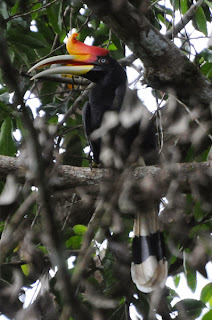This may seem odd, but during my time (in mid-September 2012) participating in a Malaysian Nature Society training course for birders at Merapoh, on the western edge of Malaysia's Taman Negara National Park, some of my most exciting wildlife observations were made from the parking lot.
At its edge, a large fruiting fig tree was a magnet for birds seeking the fruit. Next to the tree (whether by accident or design) was a tall fire tower, and a climb to the top (a nerve-wracking experience, mind you - I am a confirmed acrophobiac) brought me face to face with all sorts of wonderful creatures.
We had barely gotten out of our car, on our first day, before we saw the first of them: a pair of Rhinoceros Hornbills (Buceros rhinoceros) flying back from the fig tree into the forest proper.
From the fire tower, though, I could watch theses spectacular birds at eye level.
Almost as spectacular was a pair of Black Hornbills (Anthracoceros malayanus). The dusky female, mind you, is a rather plain creature as hornbills go, marked only by a touch of bare pink skin at the base of her bill.
The male is another matter. His huge ivory beak, surmounted by an almost ridiculously-oversized casque, is a standout even at a great distance. Close to, it is simply remarkable.
Barbets, like hornbills, are inveterate fruit-eaters. Asian barbets tend to be haunters of the canopy, far oftener heard than seen, but from the tower I could get a good look at (if not an ideal photograph of) a Brown Barbet (Calorhamphus fuliginosus) as it snatched a fig.
The Yellow-crowned Barbet (Megalaima henricii) can be a particularly difficult bird to see from ground level, but here I could easily appreciate its subtle and lovely blend of colours.At its edge, a large fruiting fig tree was a magnet for birds seeking the fruit. Next to the tree (whether by accident or design) was a tall fire tower, and a climb to the top (a nerve-wracking experience, mind you - I am a confirmed acrophobiac) brought me face to face with all sorts of wonderful creatures.
We had barely gotten out of our car, on our first day, before we saw the first of them: a pair of Rhinoceros Hornbills (Buceros rhinoceros) flying back from the fig tree into the forest proper.
From the fire tower, though, I could watch theses spectacular birds at eye level.
Almost as spectacular was a pair of Black Hornbills (Anthracoceros malayanus). The dusky female, mind you, is a rather plain creature as hornbills go, marked only by a touch of bare pink skin at the base of her bill.
The male is another matter. His huge ivory beak, surmounted by an almost ridiculously-oversized casque, is a standout even at a great distance. Close to, it is simply remarkable.
Barbets, like hornbills, are inveterate fruit-eaters. Asian barbets tend to be haunters of the canopy, far oftener heard than seen, but from the tower I could get a good look at (if not an ideal photograph of) a Brown Barbet (Calorhamphus fuliginosus) as it snatched a fig.
Not surprisingly, the tree was usually full of bulbuls of various sorts; here is an Asian Red-eyed Bulbul (Pycnonotus brunneus), the commonest of the lot.
Male Asian Fairy Bluebirds (Irena puella) are remarkably beautiful birds, but as their brightest colour is on their backs they can be hard to appreciate from below (my usual view).
Noisy groups of Common Hill Mynas (Gracula religiosa) - a bird most of us are, unfortunately, more likely to see in a cage - vied for figs with the Fairy Bluebirds.
Other birds I usually only see from below, at great risk to the back of my neck: a Blue-crowned Hanging Parrot (Loriculus galgulus), taking a moment to preen...
... a female Dark-throated Oriole (Oriolus xanthonotus)...
...and a Greater Green Leafbird (Chloropsis sonnerati), also a female.
The birds didn't have the tree to themselves. Long tailed Macaques (Macaca fascicularis) were regular visitors.
So were squirrels. This is a Plantain Squirrel (Callosciurus notatus), probably the most common and widespread Malaysian species.
Far more spectacular were startlingly-gorgeous Prevost's Squirrels (Callosciurus prevostii), among the world's most colourful mammals.
Though they are common enough, Prevost's Squirrels are not always easy to get close to - so I make no apologies for posting more than the usual number of photos.
The squirrels were wonderful, but the mammalian star performers had to be a family troop of Siamangs (Symphalangus syndactylus), largest of the gibbons (and a species absent from my more usual haunts in East Malaysia).
Their melodious morning hoots, amplified by the male's expandable throat sac, rank among the most magnificent sounds in nature. Getting on close terms with any wild ape is always a memorable experience, and the fact that it was a daily event at Merapoh made my visit there all the more remarkable.






































amazing, sir
ReplyDeleteVery amazing, mr. Ron
ReplyDelete